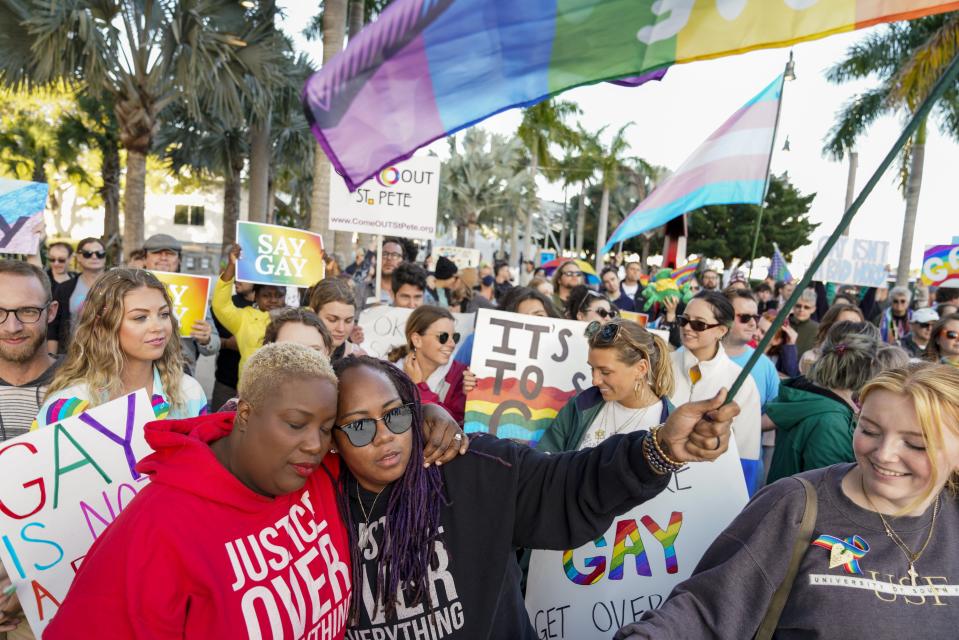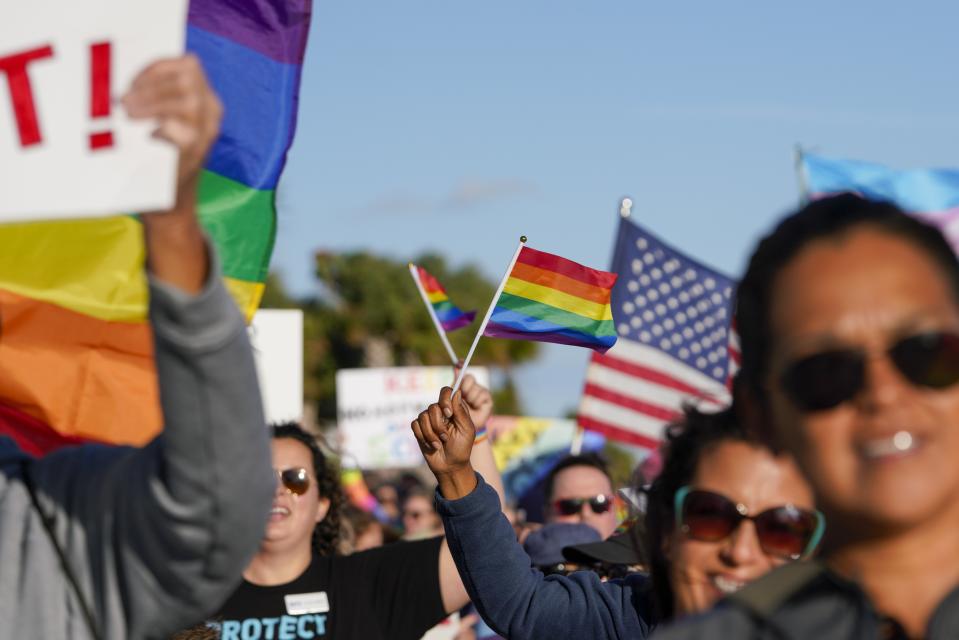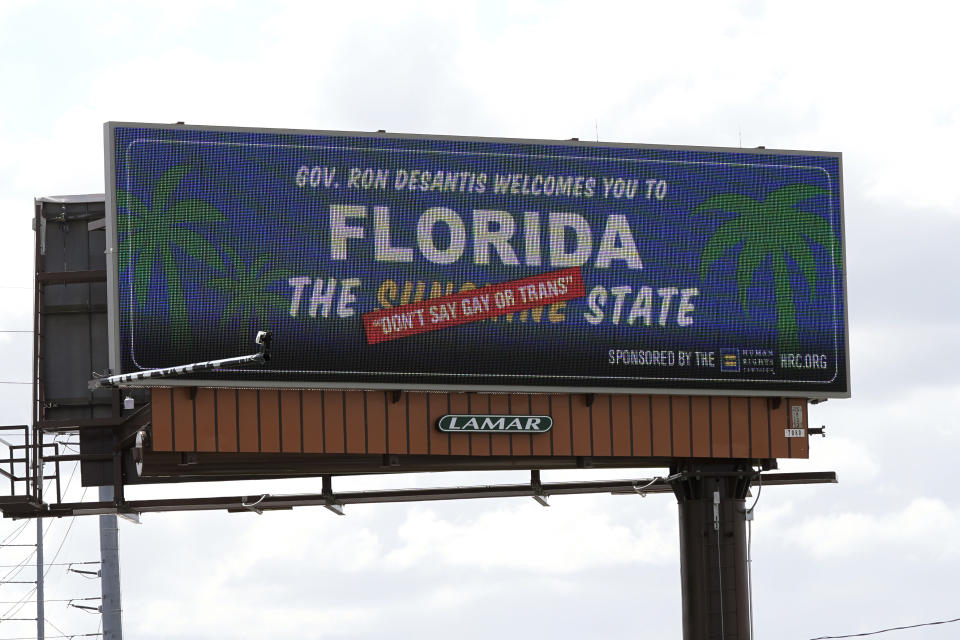What to know about a settlement that clarifies what's legal under Florida's 'Don't Say Gay' law
The Florida law labeled by critics as “ Don't Say Gay ” is remaining in place under a settlement reached this week between the state and parents, students, teachers and advocacy groups who challenged it in court.
But the fallout that gave it that nickname is nixed under the deal.
Florida's 2022 law was created to push back against what conservatives characterize as efforts to indoctrinate kids to a liberal ideology.
It is one of the highest-profile among dozens of measures adopted in Republican-controlled states to try to rein in what can be taught about LGBTQ+ issues — and the rights of LGBTQ+ people — in a movement championed by Florida governor and former presidential candidate Ron DeSantis, among others.
Here are things to know about the fallout from Florida's settlement.
WHAT DOES THE SETTLEMENT CHANGE?
The main thing the settlement does is clarify a law that was purposely vague so it could be used as a weapon to discriminate, said Joe Saunders, senior political director at Equality Florida and a former state lawmaker.
A key point of clarity is how the law applies to “classroom instruction,” as opposed to mere discussion or mention of a topic anywhere on school grounds.
He listed some things that will change now:
— Books featuring LGBTQ+ characters were removed from school libraries in one county. Those books must now be returned. But depending on the content of the book, a teacher might not be able to, say, read it aloud to a class.
— Anti-bullying programs that had been ditched because they addressed anti-LGBTQ+ bullying can resume.
— Teachers in a county that once allowed them to designate their classrooms as LGBTQ+ safe spaces with a sticker on the door were required to peel them off. Now, the stickers can return.
— One valedictorian was forced to censor a commencement speech in which he mentioned he was gay. That kind of censorship would no longer be allowed.
— Lawyers advised teachers in one county that they shouldn’t talk with students about LGBTQ+ issues or, if they were in a same-sex relationship, even put family photos on their desks. Those photos can now come out of the closet.
— Some after-school gay-straight alliances canceled meetings or went underground because most are advised by teachers, some of whom worried about being punished. Those are now clearly allowed.
“What the settlement now makes clear is that students can say ‘gay’ in Florida schools, that students can say ‘trans’ in schools ... and not have to deal with censorship from the weaponized vagueness of the law,” Saunders said in an interview Tuesday.
WHAT'S NEXT IN FLORIDA?
The agreement took effect immediately when it was signed by a lawyer for the state government on Monday.
Under the agreement, the state government is to share the settlement — and guidance on how to implement it — with the state's 67 county school districts.
The agreement does not lay out a timeline for that.
Katie Blankenship, director of PEN America Florida, said her group will watch closely to see what happens to classroom books that had been removed or covered up with paper because of Florida’s law.
“I want to know that teachers are being assured they can still share their classroom libraries,” Blankenship said.
WHICH OTHER STATES HAVE SIMILAR LAWS?
Since 2022, at least six other states have adopted laws similar to Florida's.
A court has put on hold enforcement of Iowa's law from last year.
Laws are in effect in Alabama, Arkansas, Indiana, Kentucky and North Carolina. A federal challenge over Indiana’s is pending before the 7th U.S. Circuit Court of Appeals.
It's not immediately clear whether the Florida settlement could sway what happens in the other states.
Some of the measures apply the instruction bans only to younger grades — as Florida's did when it was initially adopted. Others apply it to all public school students. Florida's was expanded through a state Board of Education policy last year.
WHAT DOES THIS MEAN POLITICALLY?
Both in Florida and nationally, DeSantis has built his brand as a conservative willing to go to battle, and the curriculum law he signed in 2022 was a prime example.
The approach did not help him make much of a dent in this year's GOP presidential primary. He dropped out of the race after a blowout loss in the Iowa caucuses in January and endorsed former President Donald Trump.
Both DeSantis and the plaintiffs in the challenge to the law emerged from the settlement claiming victory.
In a statement, his office called the deal “a major win against the activists who sought to stop Florida’s efforts to keep radical gender and sexual ideology out of the classrooms.”
Those who challenged it said the settlement provides clarity and “effectively nullifies the most dangerous and discriminatory impacts” of the law.
Jamie Miller, executive director of the Florida GOP, said that by leaving the law in place, it does give each side room to say they prevailed. “Democrats can say they had a political victory,” Miller said. And DeSantis emerged with the law he championed intact: “His goal was to protect children from classroom instruction that was in conflict with our state culture,” Miller said. “He accomplished that.”
Miller said he doesn't expect the settlement will impact DeSantis' political future.

 Yahoo News
Yahoo News 


